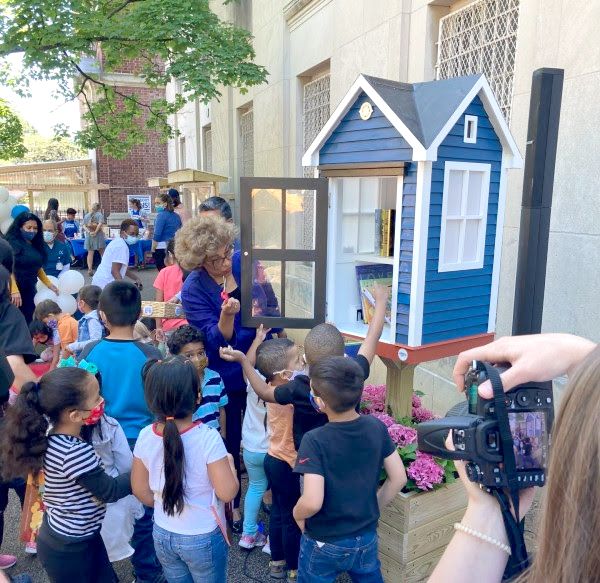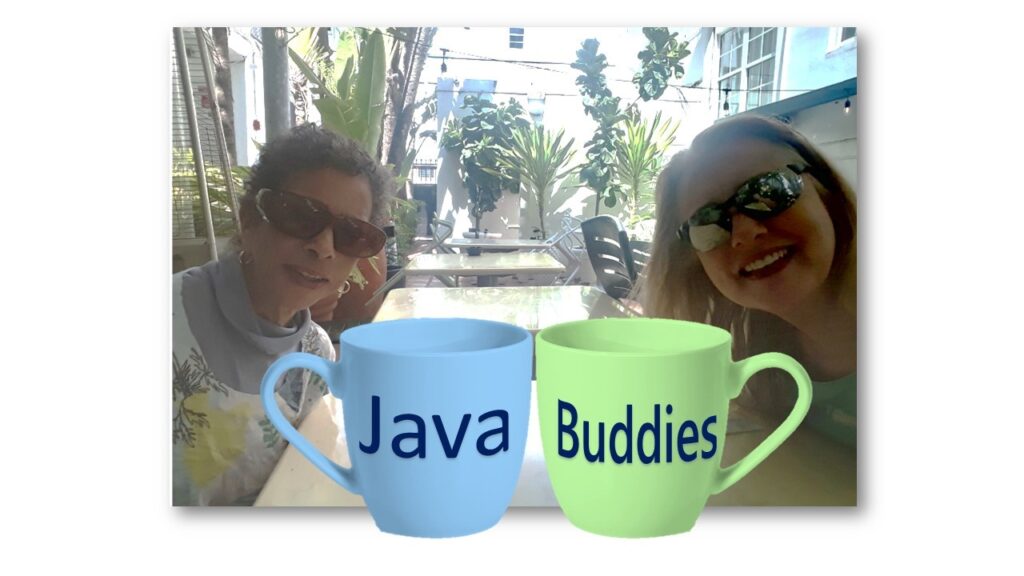Built of wood and featuring a distinctive A-frame construction, the new Little Free Library at CentroNía, a bilingual and multicultural early childhood education provider in Columbia Heights, looks much the same as the existing book-sharing boxes popularized by its eponymous sponsor. But the contents make this one stand out.
In late June, the Wisconsin-based nonprofit Little Free Library brought its new “Read in Color” initiative to D.C. with the blue and white box at 1420 Columbia Road NW. It’s filled with books that provide perspectives on racism and social justice as part of a new initiative to expand and diversify the group’s network of “take-a-book, share-a-book” free exchange libraries.
The group behind book-sharing boxes found in neighborhoods throughout the District and nationwide made this push in response to last year’s calls for action on systemic racism and social inequality. D.C. is one of nine cities slated for the diversity initiative’s expansion this year.
In total, Little Free Library plans to provide 5,000 books to 21 new locations scattered throughout the District. These locations have not all been identified yet, but the group’s local partner hopes to have them all in operation by the end of September.
Featured books incorporate the experiences of people from all identities and celebrate the voices of people who are Black, Indigenous, LGBTQ+ or from other diverse backgrounds. The initiative — which launched late last year in Minneapolis and St. Paul — seeks not only to diversify the kinds of books that are in the Little Free Library system, but also to help expand book access for communities in need. The majority of Little Free Library’s existing book-sharing boxes in D.C. are located west of the Anacostia River with a large concentration on Capitol Hill.
Shelby King, the director of programs at Little Free Library, said that while the organization has always helped connect people through books, this new initiative incorporates more “intentionality” into its programming.

According to King, the Read in Color initiative is shaped in large part by a social theory called “windows and mirrors” that examines book diversity from two angles. With the former, “we want people to be able to look into others’ experiences to learn from them. But we also want mirrors where [the] books are reflective of [people] who are in the community they are found in,” King said.
Part of the challenge of ensuring access to this kind of literature is finding enough books that feature non-white characters. While the initiative involves all ages and includes titles by bestselling authors such as Colson Whitehead, Claudia Rankine, and Ta-Nahisi Coates, locations such as the one at CentroNía focus on children’s books — a matter of particular concern to the sponsoring organization.
A study conducted in 2020 by the Cooperative Children’s Book Center based at the University of Wisconsin found that “books about white children, talking bears, trucks, monsters, potatoes, etc. represent nearly three quarters (71%) of children’s and young adult books published” in the preceding year. By contrast, the same study found that 11.9% of books published in 2019 featured Black characters and 5.3% featured characters with Latinx backgrounds.
Exacerbating this problem, King said, is the fact that disparities in book access continue to be a serious issue in the United States.
Research conducted by the U.S. Department of Education showed that socioeconomically disadvantaged children are less likely to read at home or to have books there. Data collected by the department also show that 28% of D.C. children live in poverty and likely do not have the same kind of access to literature as children who live in higher-income households.
Through a partnership established with Harper Collins, Scholastic, and Six Degrees Publishing, Little Free Library plans to provide the selected cities across the country with just over 20,000 books that highlight diversity, inclusion, and social justice. The initiative will also add a little more than 100 new boxes by the end of this year to its nationwide network of libraries.
The nonprofit plans to work with local partners in the selected cities to develop and implement localized distribution strategies.
“We are doing a lot of listening to the people who are in the communities that we’re hoping to bring these books and libraries to,” King said, stressing the importance of responding to the individual needs of different communities.
Julian Gross, the communications and outreach manager for Everybody Wins D.C., a local literacy nonprofit that partnered with Little Free Library on this project, said that steady access to books remains an issue in underserved D.C. communities hit hardest by the pandemic.
Everybody Wins D.C. has identified sites for three new boxes — at Highland Dwellings in Ward 8, Plaza West in Ward 6, and Thomas Elementary School in Ward 7 — and is in the process of figuring out where an additional 17 Little Free Libraries will go.
“A lot [of books] are going within Ward 7 or 8 [but] we are going to spread the wealth to other wards as well,” Gross said.
Gross said Everybody Wins D.C. is working closely with the D.C. Housing Authority to help find places for the remaining Little Free Libraries.
According to Gross, it’s not only access to literary resources that is critical, but also guidance from literary mentors.
“In my own life, talking to my elementary school librarian, she knew everything about books. I could tell her all my interests and she could find the exact book for me, and it really helped me develop that level of reading,” Gross said.
But not everyone has the same level of access to literary resources as Gross did in elementary school.
For the upcoming school year, a disproportionate share of the D.C. Public Schools campuses in wards 7 and 8 won’t have a full-time librarian unless the D.C. Council acts on calls to make the position a requirement at every school, rather than discretionary. According to the council, 37 schools have decided not to have a full-time librarian, with nearly half of those located in wards 7 and 8. That’s down from 40 this year, however, amid increasing focus on the issue, including a unanimous vote by the D.C. State Board of Education in favor of staffing a library at every school.
Speaking at a budget work session last week, Ward 3 Councilmember Mary Cheh said she was “disappointed” that the council so far hasn’t identified funding “to ensure that every DCPS school has a full-time librarian.”
Cheh went on to say that “many, many studies have shown a tremendous effect that a library can have on student learning and academic outcomes.”
For Derrick Jefferson, a librarian at American University, the pandemic has highlighted just how severe the problem of limited literary access is for some communities. Throughout the pandemic, Jefferson said, libraries everywhere had to adapt to working online.
“And that in many ways shows the strength of online access and online capabilities while clearly displaying this gulf … [called] the digital divide between haves and have-nots,” Jefferson said, referring to those with access to computers and the internet and those without.
A widely disseminated tweet from a local police department in Minnesota about responding to alleged “thefts” of books from Little Free Libraries called into question the intent behind the book-sharing system, with some users claiming the network is not meant for everyone.
After some thefts from little libraries in our city, officers and staff came together to donate a bunch of books to the libraries. Now people can use and enjoy them again! ???????? pic.twitter.com/bxXFRwri4S
— Bloomington Police (@BPD_MN) July 2, 2021
In an email statement released to Street Sense Media and The DC Line, Little Free Library said it could not comment on this specific situation but said, “Our stance has always been that Little Free Libraries are free book exchanges where anyone may take books or leave books. The books are freely exchanged. The purpose of a little library is to share books — and if people are taking books, that’s a good thing!”
The issue of books disappearing in large quantities, however, has long been a subject book stewards across the country have sought to address.
In a webinar held by Little Free Library in April, some people who managed the book-sharing boxes talked about using moments where books disappear en masse as opportunities to reflect on the purpose of their system.
Several participants said to avoid using “loaded words” such as “theft” to describe these moments, and to instead celebrate these occurrences as successes. Another steward said these moments had given him cause to reflect on just how much some people need books, and how under-resourced some families are.
To Jefferson, the librarian at American University, the Read in Color initiative and additional book boxes it brings with it is a positive but small step toward addressing the need for representation in and access to literature. Putting up a box and filling it with diverse books is great — but it doesn’t resolve the issue that publishers aren’t publishing enough books by people of color, he said.
This article was co-published with The DC Line.
Will Schick covers DC government and public affairs through a partnership between Street Sense Media and The DC Line. Year one of this joint position was made possible by the Poynter-Koch Media and Journalism Fellowship, The Nash Foundation, and individual contributors.








